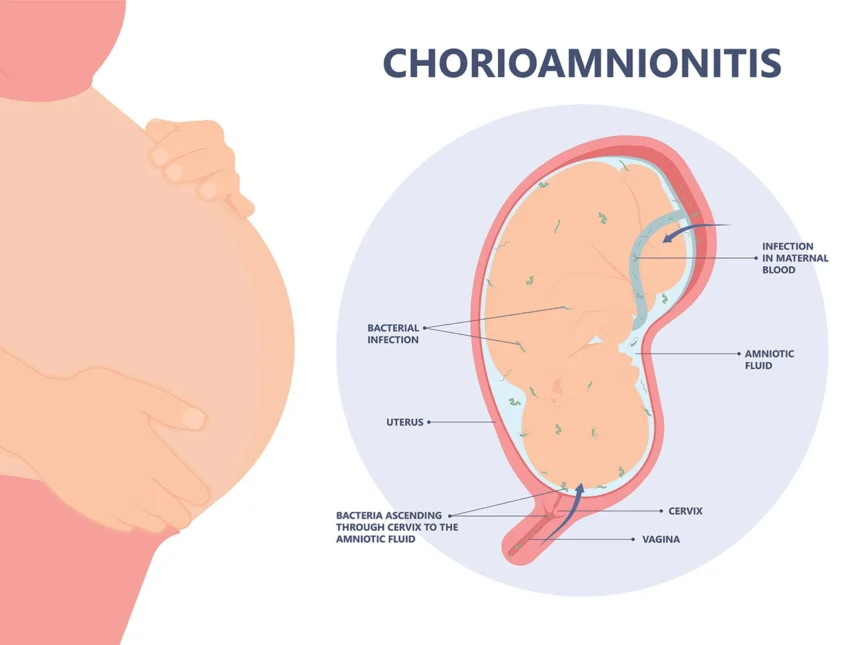Chorioamnionitis is a bacterial infection that may take place either before or while labor is in progress. The term “chorion” originates from the fluid-filled sacs that surround the fetus.
Bacterial infection of the chorion, amnion, and amniotic fluid that surrounds the fetus causes the development of this disorder. It raises the risk of the woman giving birth prematurely or both of them contracting a severe infection. It is widely common among preterm births and also seen in full-term newborns. There are a few other names for chorioamnionitis, including “amnionitis” and “intra-amniotic infection.”
Causes of Chorioamnionitis
This condition is caused by bacteria. Because these bacteria often come from a variety of distinct species, we refer to them as “poly-microbial bacteria.” They can be bacteria that are normally found in your urinary system or gastrointestinal tract, or they might have come from somewhere else.
The following are examples of some of the most common kinds of bacteria that may cause chorioamnionitis:
- E. coli Group B streptococci (GBS)
- Ureaplasma
- Human Mycoplasma, or M. hominis
It is possible for the infection to originate in the vagina or the anus and then travel to the uterus. It is also possible for the infection to start in the uterus if there is a rip or another kind of rupture that permits germs to move there.
What Factors Put You at a Greater Danger of Developing Chorioamnionitis?
Chorioamnionitis is not something that can happen to every single pregnant woman. Age and lifestyle can contribute to the risk of acquiring it.

The following are some of the factors that, if present, may enhance your likelihood of having chorioamnionitis:
- Your water breaks before it should have.
- Your labour is going to be incredibly drawn out before birth.
- During labour, you will have a number of examinations of your vaginal area.
- You suffer from an illness that is spread via sexual contact.
- You have a distinct infection in either your vagina, urinary tract, or placenta.
- You already have one kid, and during your previous pregnancy, you suffered from chorioamnionitis.
- During the labour process, you will get an epidural anesthetic.
- You have a cervix that is rather short.
- You engage in the use of cigarettes, alcohol, or illicit substances.
- You are immune-compromised. Chorioamnionitis
Signs and Symptoms
There are instances in which pregnant women do not present with any signs of chorioamnionitis. This is particularly the case for women who acquire the condition early on in their pregnancy. In the majority of cases, the fever persists and is always higher than 100.4 degrees Fahrenheit.
The following are some other indications and symptoms that you may experience:
- A racing pulse (above 100 beats per minute)
- Rapid beating of the heart in foetuses (above 160 beats per minute)
- Tender uterus
- Sweating
- Bad smelly fluid discharge Physical Examination
Diagnostic Procedure?
A trained medical professional can diagnose the disease accurately. The simplest way to diagnose the condition is through a physical examination.
Additionally, your physician may decide to request blood culture and urine testing. These examinations look for germs everywhere they can find in your body. The complete blood count (CBC) test evaluates many aspects of your health, including your white blood cell count.
In addition to these tests, your physician may decide to do an ultrasound, take a sample of your amniotic fluid, and perform a GBS vaginal culture. Taking a sample of the amniotic fluid from the pregnant woman is normally only possible after her water has already burst.
What Kinds of Treatments Are Available?
Medical intervention is necessary if a person experiences chorioamnionitis. The patients receive standard treatment. Intravenous antibiotics were administered. In addition to that, you could get acetaminophen to help bring down your fever.
The antibiotic treatment must continue until the infection has completely gone away. When you get the infection on giving birth, you can continue taking antibiotics.
It is possible that your doctor may recommend that you induce labour if your unborn child has contracted the virus and their health is not stable. After the delivery of your child, they will also start receiving antibiotics via an IV.
What complications Are There to Overcome?
Chorioamnionitis is a condition that may result in a wide variety of difficulties for both the mother and the child. You run the risk of developing issues such as the following:
- Bleeding after delivery
- Clots of blood were found on the leg
- Pelvic sores
- Endometritis that has led to sepsis
In extreme circumstances; you run the risk of developing the following complications:
- Acute septic shock
- Clots of various sizes are located throughout the bloodstream
- Symptoms include shallow breathing and a pallor developing on the skin
If the infection has spread throughout the body for a significant amount of time before your physician makes the diagnosis, your pregnancy may end in stillbirth or death after delivery.
Chorioamnionitis: Is There Any Way to Prevent It?
It is possible to avoid chorioamnionitis. On other occasions, you could get this illness even though you take all of the necessary precautions.
Regular examinations help detect vaginal irritation or the first indications of an infection. In the final month of your pregnancy, your doctor may also prescribe blood tests to look for GBS, a common bacterium that may cause chorioamnionitis.
Vaginal examinations before labor lower the chances of getting the infection.
Make an appointment to see your primary care physician as soon as possible if you see any of the signs and symptoms described above. Checkups at regular intervals may assist ensure that you have a safe pregnancy and delivery without any complications.







